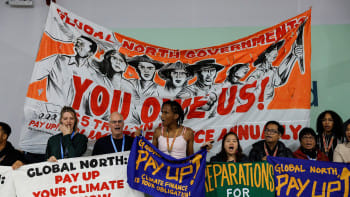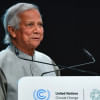Developed nations are missing the bus

We are disheartened by the outcome of the negotiations at the COP29 summit between developed and developing countries regarding the amount of money the former will pay the latter to tackle the devastating impacts of climate change. As we all know, developed countries are the biggest contributors to climate change, while developing nations bear the highest costs of its impacts. This is why developing nations have expressed their shock at the $250 billion per year fund proposed in a draft deal by the developed nations. It is a deliberate deviation from their commitment to the Paris Agreement.
Developing countries had called for $1.3 trillion to be mobilised annually by developed countries. The funds would be in the form of grants and would be disbursed starting next year. Another draft—the New Collective Quantified Goal on Climate Finance (NCQG)—has also proven disappointing, as our adviser to the environment ministry has rightly pointed out. The adviser criticised the package for failing to meet the essential needs of the Least Developed Countries (LDCs) and the Small Island Developing States (SIDS).
It seems the developed nations have chosen to disregard the spirit of the Paris Agreement, which clearly states that developed countries are to provide financial resources to assist developing nations in their mitigation and adaptation efforts. It is also disconcerting that not all of these funds will be grants; some will come in the form of loans, which experts warn could increase the indebtedness of poorer nations already burdened by loans for their development needs. The latest text at COP29 has broadened the base of climate finance donors, meaning some developing countries may also have to contribute to the targeted $1.3 trillion per year by 2035.
These developments do not bode well for our future. The effects of climate change are becoming more severe and frequent each year, as manifested all over the world, but more profoundly in poorer nations. It makes little sense that developed nations have chosen to adopt an ostrich approach when it comes to adhering to their commitments. Contributing to climate funding is not a favour to developed nations—it is an obligation.
Experts have reiterated that we are still heading in the wrong direction, with greenhouse gas emissions increasing rather than decreasing. The goal of limiting the temperature rise to within 1.5 degrees Celsius is becoming more and more far-fetched. This places millions of people at risk of being displaced, suffering severe health problems, and experiencing adverse societal changes globally. Developed countries must realise that they are jeopardising the survival of humankind as a whole by not fulfilling their obligations to reduce the catastrophic impacts of climate change. It is in their own interest, as much as it is in that of the developing world.

 For all latest news, follow The Daily Star's Google News channel.
For all latest news, follow The Daily Star's Google News channel. 










Comments